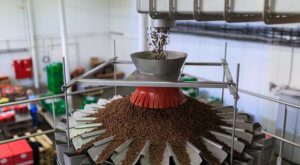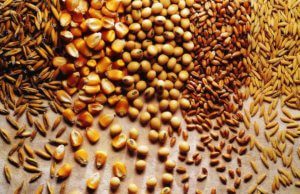
The Ukrainian producer of food for pets, Kormotech LLC (Lviv region) plans to boost pet food sales by 21.8% at the end of 2018 from a year ago, to 38.4 tonnes.
“Sales for the first half of the year increased 31.1% compared to the same period of 2017. We intend to increase sales of pet food in 2018 by 21.8% compared with last year. We sold 31.5 tonnes of products in 2017, revenues amounted to UAH 1 billion,” CEO and co-founder of Kormotech Rostyslav Vovk said in an interview with Interfax-Ukraine.
According to him, at the end of 2017, the share of Kormotech in terms of sales of the Ukrainian market was 36.2%.
“Of these, our brands had 31.5%, and another 4.7% – products that we produce under a private label,” Vovk said.
He said that in the third quarter of this year, the company was forced to completely suspend the plant for one week to install new equipment and two more – to work in test mode to fully configure and launch the updated production line.
“This modernization allows us to increase our capacity next year, but it has somewhat reduced our production capacity now. Therefore, by the end of 2018, we expect to keep the same position as last year, or slightly concede (no more than 1% of the market share). Next year we plan to regain the market share we had at the beginning of 2018 and keep it until the end of 2019. And in the next three years we are trying to increase it by 2-3%,” the Kormotech CEO said.
Vovk said that now the production facilities are loaded in full and the company plans to increase the annual capacity to 30,000 tonnes of dry feed and 16,000 tonnes of wet feed by the end of this year.
“Now it is 28,000 tonnes of dry and 11,000 tonnes of wet feed. To better present the quantity, it is 70 million 400-gram packages of dry and 110 million 100-gram packages of wet feed,” he said, adding that about 30% of imported raw materials are used to make the feed.
Kormotech exports its products to 17 countries, including France, Estonia, the Netherlands, Slovenia and Poland. The company has two plants that produce dry and wet pet feed.

On Tuesday, the Ministry of Youth and Sports of Ukraine signed an agreement on cooperation in the field of physical culture and sports with the Secretariat of Sports of the Argentine Republic, Minister of Youth and Sports of Ukraine Ihor Zhdanov has said.
“While visiting Buenos Aires, I signed an agreement between the Ministry of Youth and Sports of Ukraine and the Secretariat of Sports of the Argentine Republic on cooperation in the field of physical culture and sports,” the minister wrote on his Facebook page on Tuesday.
He noted that Secretary of State for Sports of Argentina Carlos Javier Mac Allister, who is a member of the government, and his successor, Diogenes de Urquiza, attended the signing ceremony. He starts to perform the duties of his colleague in a month.
According to Zhdanov, the agreement establishes the legal framework of the Ukrainian-Argentine cooperation in the field of physical culture and sports through the central executive bodies and public organizations of physical culture and sports.
“There will be an intensive exchange of experience between coaches and athletes of both countries within the framework of the agreement,” the minister said.
Study visits of specialists, organization and holding of seminars and conferences on issues of the sphere of physical culture and sports with the participation of representatives of state bodies, national federations for sports, sports societies and clubs are planned.

Ukraine since the beginning of the 2018/2019 marketing year (MY, July-June) and as of October 17 had exported 11.132 million tonnes of grain, which is 3.4% less than on the same date of the previous MY. According to the Ministry of Agrarian Policy and Food, the country exported about 6.68 million tonnes of wheat, 2.3 million tonnes of barley, and 1.91 million tonnes of corn.
In addition, 57,600 tonnes of flour had been exported by that date. As reported, with reference to the ministry, Ukraine exported 39.4 million tonnes of grain in the 2017/2018 MY. Grain exports in the 2018/2019 MY are projected to be 42 million tonnes.

Rubizhne cardboard packaging mill in Luhansk region, one of Ukraine’s largest cardboard packaging producers, produced 188.62 million square meters of corrugated cardboard boxes in January-September 2018, including goods from its Trypilsky packaging plant, which is 14.5% up year-over-year. The mills increased production of components of corrugated cardboard (cardboard and fluting) by 4.4%, to 219,210 tonnes.
The total commodity amount produced by both plants in the period in monetary terms grew by 30.6%, to UAH 4.138 billion. According to UkrPapir association, cardboard packaging production in Ukraine in January-September 2018 grew by 1.2% and amounted to 748.29 million square meters.
The Rubizhne cardboard packaging mill has worked on the packaging market since 1991, and specializes in the production of components for corrugated cardboard (cardboard and fluting) and corrugated cardboard boxes. Its most important customers are large confectioneries, juice and tobacco producers. The Rubizhne cardboard packaging mill acquired Trypilsky packaging plant in 2002 and subsequently began producing corrugated cardboard and corrugated packaging.

The Ukrainian business retains positive expectations regarding the level of business activity for the next 12 months, according to a poll of company heads conducted by the National Bank of Ukraine (NBU) in the third quarter of 2018. “As in the previous polls, business activity is expected to boost by respondents of all types of economic activity. The most optimistic forecasts are in the processing industry. The business expectations index for the next 12 months was 117.2%,” the central bank reported on its website. The high economic activity growth pace remains mainly due to improved forecasts for the total sales of own products, as well as investment expenditures on machinery, equipment and inventory. At the same time, enterprises of all types of activities, except agricultural, expect further growth of foreign investments.
At the same time, the business pointed out a low level of stocks of finished products and the lack of its own production facilities in the event of an unexpected increase in demand.
The expectations of the respondents regarding the need for borrowed funds in the near future remained virtually unchanged compared with the previous quarter. At the same time, the majority of respondents who plan to attract loans are interested in financing in national currency. At the same time, the share of respondents planning to attract bank loans is declining for the third quarter in a row amid high credit rates.
The expectations of all enterprises in terms of production of goods and services in Ukraine for the next 12 months remain high: more than 30% of respondents expect production to grow, and about 50% are convinced that it will remain at the same level. Positive expectations have been observed for the last 10 quarters in a row.
For the second quarter in a row, the surveyed enterprises are lowering inflation expectations. “According to the survey, consumer price growth is expected to be at the level of 8.9% (in the second quarter of 2018 – 9.6%). The main factor affecting the price increase is the hryvnia exchange rate to foreign currencies (82.8% of responses). Production costs are at the second position, but the weight of this factor decreased by 3.1 percentage points compared to the previous quarter – to 68.5%,” the NBU said.
According to representatives of enterprises surveyed, in the next 12 months, consumer income and prices in global markets will affect the dynamics of consumer prices.
The National Bank said that the survey was conducted from August 3 through September 4, 2018. A total of 682 enterprises from 22 regions (excluding the temporarily occupied territories of the Autonomous Republic of Crimea, as well as Donetsk and Luhansk regions), which represent the economy by main types of activities, ownership and size by the number of employees, took part in the survey.